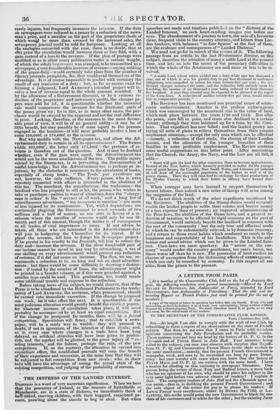exi sting 'competition, and judging of the probability, of success. ,
- THE DISTRESS OF THE LANDED INTEREST.' Dksranss is a word of very uncertain signification. When we hear that the peasantry of Ireland, or the weavers of Spitalfields or Manchester, are in a state of distress, we immediately think of half-naked, starving children, with their haggard, emaciated pa- rents, prowling about -the' streets to -beg or steal. But when speeches are made and treatises published on the "distress of the Landed Interest," no such heart-rending images rise before our eyes. The abandonment of a journey to town, the sale of a favourite racer, frequent visits to the country attorney, and letters from Lon- don bankers, with balances "iii four figures" at the foot of them, are the evidence and consequences of "Landed Distress." We need not go far in search of the causes of it. The following passage from an article in the last Westminster Review, on this subject, describes the situ' ation of many a noble Lord at the present time, and lets us into the secret of the pecuniary difficulties in which the whole of the Aristocracy are said more or less to be in volved. • " A noble Lord, whose estate yielded not a long while ago ten thousand a year, out of which it was his painful duty to pay fourthousand in settlement obligations, was compelled to reduce his rents twenty-five per cent. ; the set- tlement charges remained the same, and the reduction falls entirely upon his Lordship, his income of six thousand a year being reduced to three thousand five hundred. A man thus situated may be expected to be alarmed at the repeal of the Corn-laws. A reduction of another twenty-five per cent, would reduce him to comparative poverty."
The Reviewer has here mentioned one principal cause of aristo- cratic embarrassment. Another is the profuse extravagance which was encouraged by the unnatural rise in the value of land, which took place between the years 1790 and 1812. But after the peace, corn fell in price, and rents also declined to a certain extent; although they were bolstered up for a time by the Corn- laws. That expedient has now failed; and the landed gentry are trying all sorts of plans to relieve themselves from their pres,ent unpleasant situation,—except the only ones which can be effectual —namely, a reduction Of their studs, the closing of their London houses, and the education of the younger branches of their families to some profitable employment. The Review contains some useful suggestions on this latter • point. After mentioning that the Church, the Army, the Navy, and the Law are all full, it adds-7- " Some will quit the land for other countries, there to become agriculturists. Instead of the East Indies, which formerly provided an outlet for the younger sons of great houses, the Canadas, New South Wales, and Colonies vet unheard of, will draw off the overloaded population of the higher as well as of the poorer classes. There they will raise food to exchange for those productions of the Mother Country to which their habits in infancy have formed their tastes."
When younger sons have learned to support themselves by honest labour, then indeed a new order of things will arise among the magnates of the land. We do not think much of the other expedients mentioned by the Reviewer. The abolition of the Stamp-duties would certainly enable the landed people to settle their estates and borrow money at a less expense than at present ; an improved administration of the Poor-laws, the abolition of the Game-laws, and a general re- duction of taxation, to be effected by rigid economy on the part of Government, would certainly benefit the landlord in common with the rest of the community : but the only true and effectual mode by which he can be substantially relieved, is by domestic economy, and a return to those rural habits which conduced so much to the happiness and respectability of his forefathers. This is the only 'honest and sound advice which can be given to the Landed Inte- rest. Corn-laws are mere quackery. An "action on the cur- rency" would render th'e country gentleman, ten years hence, ten times worse off than he is no*. The possession of land confers no charter of exemption from the distressing effects of extravagance; which can only be remedied by. economy. In this respect all are alike, from the prince to the peasant.


















 Previous page
Previous page